
Contemporary culture has eliminated both the concept of the public and the figure of the intellectual. Former public spaces both physical and cultural are now either derelict or colonized by advertising. A cretinous anti-intellectualism presides, cheerled by expensively educated hacks in the pay of multinational corporations who reassure their bored readers that there is no need to rouse themselves from their interpassive stupor. The informal censorship internalized and propagated by the cultural workers of late capitalism generates a banal conformity that the propaganda chiefs of Stalinism could only ever have dreamt of imposing. Zer0 Books knows that another kind of discourse intellectual without being academic, popular without being populist is not only possible: it is already flourishing, in the regions beyond the striplit malls of so-called mass media and the neurotically bureaucratic halls of the academy. Zer0 is committed to the idea of publishing as a making public of the intellectual. It is convinced that in the unthinking, blandly consensual culture in which we live, critical and engaged theoretical reflection is more important than ever before.
References
Abbot, Scott and Haney, Chris (1979). Trivial Pursuit [Board game], Horn Abbott.
Adams, Ernest and Rollings, Andrew (2003). Andrew Rollings and Ernest Adams on game design , Berkley, CA, New Riders Publishing.
Andrew, R. L., and Rogers, L. (1972). Testosterone, search behavior and persistence, Nature , 237, pp. 343346.
Angel Studios (1999). Midtown Madness [Disc], PC, Redmond, WA, Microsoft Corporation.
Appiah, Kwame Anthony (2006). Cosmopolitanism: Ethics in a World of Strangers , New York, Norton.
Arendt, Hannah (1961). Between Past and Future . New York, The Viking Press.
Arendt, Hannah (2005). The Promise of Politics , edited by Jerome Kohn, New York, Schocken Books.
Aristotle (350 BC). Of the Nose, Problemata .
Artaud, Antonin (1938). The Theatre and its Double , New York, Grove.
Atari (1972). Pong [Arcade], Sunnyvale, CA, Atari, Inc.
Atari (1974). Gran Trak 10 [Arcade], Sunnyvale, CA, Atari, Inc.
Atari (1974). Quak! [Arcade], Sunnyvale, CA, Atari, Inc.
Atari (1983). Star Wars [Arcade], Sunnyvale, CA, Atari, Inc..
Atari (1988). Hard Drivin [Arcade], Sunnyvale, CA, Atari Corporation.
Avildsen, John G. (1976). Rocky [Film], Century City, CA, United Artists.
Bahm, Archie J. (1971). Science is not value-free, Policy Sciences, vol. 2, no. 4, pp. 391-396.
Barnett, Gregg (1985). Way of the Exploding Fist [Tape], Commodore 64, Melbourne, Melbourne House.
Bateman, Chris (editor) (2009). Beyond Game Design: Nine Steps Towards Creating Better Videogames , Boston, Cengage Learning.
Bateman, Chris and Nacke, Lennart (2010). The Neurobiology of Play, Proceedings of Future Play 2010 , Vancouver, pp. 24-31.
Beardsley, Monroe (1958). Aesthetics: Problems in the Philosophy of Criticism , New York, NY, Harcourt, Brace & World, Inc.
Bekoff, Marc (2002). Virtuous nature, New Scientist , no. 2351, pp. 34-37.
Bekoff, Marc and Pierce, Jessica (2009). Wild Justice: The Moral Lives of Animals , Chicago, Chicago University Press.
Benedetti, Winda (2007). Were video games to blame for massacre?, MSNBC.com, 20 March, [online] http://www.msnbc.msn.com/id/18220228/ (Accessed September 2010).
Berlinger, Yehuda (2008). The Press wont Shut Up about the World Monopoly Vote, Yehuda: Gaming, Technology, Philosophy, and Life , 1 February [online] http://jergames.blogspot.com/2008/02/press-wont-shut-up-about-world-monopoly.html (Accessed September 2010).
Bethesda (2006). The Elder Scrolls IV: Oblivion [Disc], PC and Xbox 360, Novato, CA, 2K Games.
Biederman, Irving., Vessel, Edward. A. (2006). Perceptual Pleasure and the Brain. American Scientist , no. 94, 249-255.
BioWare (2003). Star Wars: Knights of the Old Republic [Disc], PC and Xbox, San Francisco, CA, LucasArts Entertainment Co. LLC.
Bird, Christopher David and Emery, Nathan John (2009). Rooks Use Stones to Raise the Water Level to Reach a Floating Worm, Current Biology , vol. 19, no. 16, pp. 1410-1414.
Blizzard Entertainment (2004). World of Warcraft [Disc], PC, Blizzard Entertainment.
Board Game Geek (2010). [online] http://boardgamegeek.com/ (Accessed October 2010).
Bogost, Ian (2006). Unit Operations: An Approach to Videogame Criticism , Cambridge, MA, MIT Press.
Bogost, Ian (2009). Videogames are a Mess, Ian Bogost Videogame Theory, Criticism, Design [online] http://www.bogost.com/writing/videogames_are_a_mess.shtml (Accessed September 2010).
Booth, A., Shelley, G., Mazur, A., Tharp, G., and Kittok, R. (1989). Testosterone, and winning and losing in human competition. Hormones and Behavior , no. 23, pp. 556-571.
Brin, David (2005). An Open Letter to Researchers of Addiction, Brain Chemistry, and Social Psychology, Tomorrow Happens [online] http://www.davidbrin.com/addiction.htm (Accessed October 2010).
Bryant, Levi (2010). Art History and Video Games, Larval Subjects , 31 August [online] http://larvalsubjects.wordpress.com/2010/08/31/art-history-and-video-games/ (Accessed September 2010).
Bungee (2001). Halo: Combat Evolved [Disc], Xbox, Redmond, WA, Microsoft Corporation.
Burghardt, Gordon M. (2008). The Genesis of Animal Play , Cambridge, MA, MIT Press.
Butts, Alfred (1938). Scrabble [Board game].
Caillois, Roger (1958). Man, Play and Games , translated by Barash, Meyer (1961), Paris, Gallimard.
Calleja, Gordon (2007). Digital Games as Designed Experience: Reframing the Concept of Immersion , Wellington, NZ, Victoria University of Wellington.
Campbell, Joseph (1972). Myths to Live By . New York, Bantam.
Campbell, Joseph (2001). Thou Art That: Transforming Religious Metaphor , San Francisco, New World Library.
Cannon, Walter Bradford (1929). Bodily Changes in Pain, Hunger, Fear, and Rage , New York, Appleton-Century-Crofts.
Capcom (1987). Street Fighter [Arcade], Osaka, Capcom Co., Ltd.
Capcom (1996). Resident Evil (aka Biohazard) [Disc], PlayStation, Osaka, Capcom Co., Ltd.
Capcom (2002). Resident Evil [Disc], GameCube, Osaka, Capcom Co., Ltd.
Carroll, Nol (1985). The Power of Movies, Daedalus , vol. 114, no. 4, pp. 79-103.
Carroll, Nol (1990). The Philosophy of Horror; or, Paradoxes of the Heart , New York, Routledge.
Carroll, Nol (1991). On Kendall Waltons Mimesis as Make-Believe, Philosophy and Phenomenological Research , vol. 51, no. 2, pp. 382-387.
Cassirer, Ernst (1925). Language and Myth , translated by Langer, Susanne K. (1946), New York, Harper and Brothers.
Castle, William (1959). The Tingler [Film], Los Angeles, Columbia Pictures.
Castronova, Edward (2001). Virtual Worlds: A First-Hand Account of Market and Society on the Cyberian Frontier [online], Munich, CESifo Working Paper Series No. 618, http://ssrn.com/abstract=294828 (Accessed September 2010).
Castronova, Edward (2005). Synthetic Worlds: The Business and Culture of Online Games , Chicago, University of Chicago Press.
Clark, Luke, Lawrence, Andrew J., Astley-Jones, Frances and Gray, Nocola (2009). Gambling Near-Misses Enhance Motivation to Gamble and Recruit Win-Related Brain Circuitry, Neuron , vol. 61, p481-490.
Cogburn, Jon and Silcox, Mark (2008a). The Game Inside the Mind, the Mind Inside the Game (The Nintendo Wii Gaming Console), Philosophy Through Video Games , New York, Routledge.
Cogburn, Jon and Silcox, Mark (2008b). I, Player: The Puzzle of Personal Identity (MMORPGs and Virtual Communities), Philosophy Through Video Games , New York, Routledge.
Costa, P. T. and McCrae, R. R. (1992). NEO Personality Inventory Professional Manual . Odessa, FL, Psychological Assessment Resources.


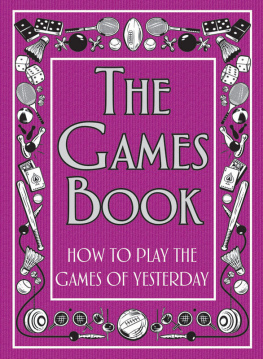
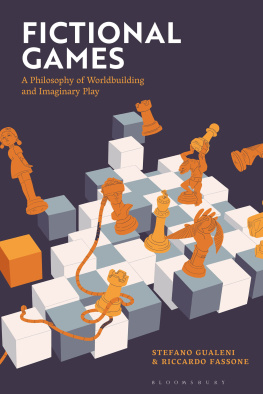




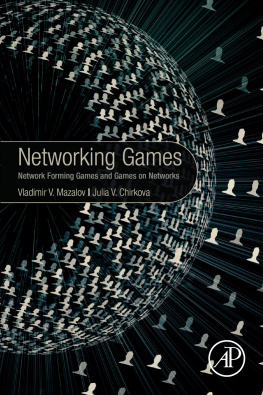
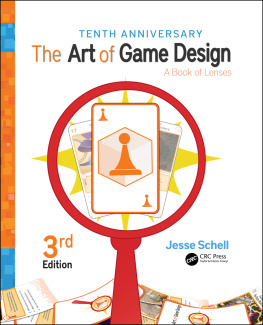
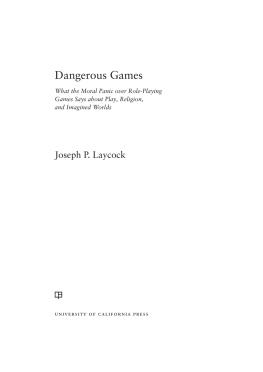
![Chris Bateman [Chris Bateman] - Beyond Game Design: Nine Steps Toward Creating Better Videogames](/uploads/posts/book/119409/thumbs/chris-bateman-chris-bateman-beyond-game-design.jpg)
